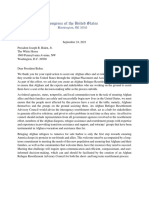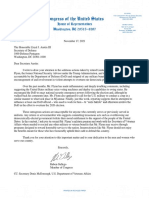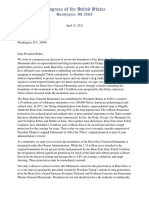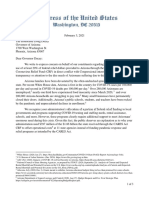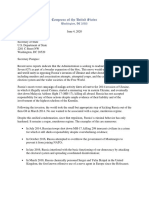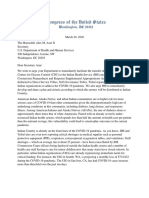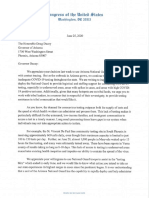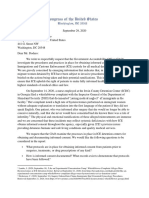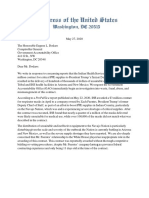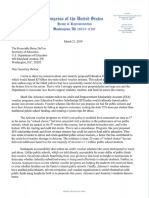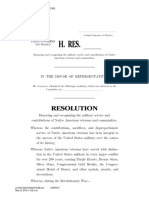Professional Documents
Culture Documents
Reps. Gallego, Grijalva and Haaland Demand Answers On National Park Service Changes To National Historic Preservation
Uploaded by
Congressman Ruben Gallego0 ratings0% found this document useful (0 votes)
229 views2 pagesRep. Ruben Gallego (D-Ariz.), joined by Reps. Raúl M. Grijalva (D-Ariz.) and Deb Haaland (D-NM), sent a letter to Secretary of the Interior David Bernhardt and the Acting Director of the National Park Service criticizing the Department’s proposed rule issued on March 1, 2019 regarding the preservation of historic properties on the National Register of Historic Places.
The letter calls for the Department to hold meaningful government-to-government consultations with Tribes on the proposed policy
Original Title
Reps. Gallego, Grijalva and Haaland Demand Answers on National Park Service Changes to National Historic Preservation
Copyright
© © All Rights Reserved
Available Formats
PDF or read online from Scribd
Share this document
Did you find this document useful?
Is this content inappropriate?
Report this DocumentRep. Ruben Gallego (D-Ariz.), joined by Reps. Raúl M. Grijalva (D-Ariz.) and Deb Haaland (D-NM), sent a letter to Secretary of the Interior David Bernhardt and the Acting Director of the National Park Service criticizing the Department’s proposed rule issued on March 1, 2019 regarding the preservation of historic properties on the National Register of Historic Places.
The letter calls for the Department to hold meaningful government-to-government consultations with Tribes on the proposed policy
Copyright:
© All Rights Reserved
Available Formats
Download as PDF or read online from Scribd
0 ratings0% found this document useful (0 votes)
229 views2 pagesReps. Gallego, Grijalva and Haaland Demand Answers On National Park Service Changes To National Historic Preservation
Uploaded by
Congressman Ruben GallegoRep. Ruben Gallego (D-Ariz.), joined by Reps. Raúl M. Grijalva (D-Ariz.) and Deb Haaland (D-NM), sent a letter to Secretary of the Interior David Bernhardt and the Acting Director of the National Park Service criticizing the Department’s proposed rule issued on March 1, 2019 regarding the preservation of historic properties on the National Register of Historic Places.
The letter calls for the Department to hold meaningful government-to-government consultations with Tribes on the proposed policy
Copyright:
© All Rights Reserved
Available Formats
Download as PDF or read online from Scribd
You are on page 1of 2
Congress of the United States
Washington, AC 20515
July 19, 2019
Secretary David Bernhardt
Department of the Interior
1849 C St., NW
Washington, DC 20240
Re: Proposed Changes to the Regulations Governing Federal Ageney Nomination of Properties to the
National Register of Historic Places
Dear Secretary Bernhardt:
On May 14, 2019, we wrote to express our concerns with the National Park Service's proposed rule, Fed,
Reg, 41, 6996-7005, issued on March 1, 2019. To date, we have not received a response to our letter. We
‘write to reiterate our deep concems about inaclequate tribal consultation and the consequences of finalizing
the proposed rule without changes. We also request a response to our concems in the form of a
congressional briefing with relevant National Park Service staff prior to final rulemaking.
In light of the clear impacts this proposed rule would have on tribes, we were encouraged to see that the
National Park Service revised its initial stance that “tribal consultation is not required because the rule will
not have a substantial direct effect on federally recognized tribes” when, on May 24, 2019, it published a
“Notice of Tribal consultation” and acknowledged the substantial direct effects the proposed rule would
have on tribes. However, the tribal “consultation” described in the notice, consisting of one meeting and
one teleconference in the space of a week, falls far short of the substantive consultation required by your
Department's own policy and by our federal trust responsibilities as outlined in Executive Order 13175.
Tribes maintain deep cultural, historical, and archeological connections to what are now federal lands. In
fact, the NHPA explicitly states that tribes have special expertise in identifying and assessing the NRHP
eligibility of properties significant to them, and that agencies are obligated to consult with them on federal
undertakings regardless of location, For this reason, it is critical that the Department not merely “check a
box” when it comes to consultation with our tribal partners, but rather engage in a meaningful
government-to-government consultation process. In this context, meaningful consultation includes, but is
not limited to, engagement with tribal nations by Departmental officials possessing decision-making
authority in all the geographical regions in which tribes are located to ensure that tribal concems are
comprehensively gathered and fully addressed before a final rule is promulgated.
Even in the context of the inadequate “consultation” process offered by your Department in this case,
multiple substantive concerns regarding the proposed rule were raised by tribal leaders, reflecting the
issues touched on in our previous letter. During the “consultation,” Department officials indicated their
desire for more detail with regard to certain substantive concems, which could be better fleshed out and
addressed in a full and meaningful consultation process,
One such concer, which has been raised by many tribal govemments and organizations, is the proposed
rule’s exceedance of the scope of the 2016 amendments to the National Historic Preservation Act (NHPA).
First, the proposed rule would make federal agencies the only entities capable of initiating a nomination or
determination of National Register of Historic Places (NRHP) eligibility of properties located on federal
lands. Second, the proposed rule would improperly eliminate a party’s ability under the NHPA, as
amended, to appeal a federal agency’s failure to nominate a property to the National Register of Historic
Places. These changes directly conflict with the intent and content of the 2016 amendments to the NHPA
and would effectively exclude multiple stakeholders, including tribes, from the federal process of
preserving historic and cultural properties under the NHPA.
Additionally, as noted in our previous letter, the proposed rule would grant effective veto power to large
land owners in and around potentially NRHP-eligible properties, who in many cases are ranch-owners,
mine-owners, or energy developers whose interests directly conflict with historic preservation, We are
concerned that this change, which does not reflect any existing provision in the NHPA, would jeopardize
the preservation of historical and cultural properties of tribal significance on federal lands, which are an
essential part of the rich heritage and history of America,
Due to our considerable procedural and substantive concerns with this proposed rule, we respectfully
request a congressional briefing from relevant, decision-making staff at the National Park Service on the
development, substance, and status of the rule before itis finalized. Additionally, we request that you
reevaluate the proposed rule’s compatibility with a good-faith interpretation of the NHPA and suspend.
further action on this proposed rule until the Department completes a full and meaningful government-to-
‘government consultation process and fully addresses the concerns with the proposed rule expressed by
tribal governments and organizations.
We look forward to receiving your response to our requests,
Sincerely,
Ruben Gallego Cc M. Mu eb FTaaland
Chairman Chairman Chairwoman
‘Subcommittee for Indigenous House Committee on uo ‘Subcommittee on National
Peoples of the U.S. Resources Parks, Forests, & Public Lands
CC: Dan Smith, Deputy Director, exercising the authority of the Director of the National Park Service
You might also like
- The Subtle Art of Not Giving a F*ck: A Counterintuitive Approach to Living a Good LifeFrom EverandThe Subtle Art of Not Giving a F*ck: A Counterintuitive Approach to Living a Good LifeRating: 4 out of 5 stars4/5 (5794)
- The Yellow House: A Memoir (2019 National Book Award Winner)From EverandThe Yellow House: A Memoir (2019 National Book Award Winner)Rating: 4 out of 5 stars4/5 (98)
- Rep. Gallego Afghan Resettlement Advisory Council LetterDocument2 pagesRep. Gallego Afghan Resettlement Advisory Council LetterCongressman Ruben GallegoNo ratings yet
- WIMA Bill TextDocument9 pagesWIMA Bill TextCongressman Ruben GallegoNo ratings yet
- 11-17 Gallego Flynn LetterDocument1 page11-17 Gallego Flynn LetterCongressman Ruben GallegoNo ratings yet
- Rep. Gallego Community Project Funding AnnouncementDocument4 pagesRep. Gallego Community Project Funding AnnouncementCongressman Ruben GallegoNo ratings yet
- Ducey Letter ARPA and Prop 208Document3 pagesDucey Letter ARPA and Prop 208Congressman Ruben GallegoNo ratings yet
- Reps. Gallego and Grijalva Lead Call To Restore and Expand Protections For Bears Ears National MonumentDocument4 pagesReps. Gallego and Grijalva Lead Call To Restore and Expand Protections For Bears Ears National MonumentCongressman Ruben GallegoNo ratings yet
- AZ Dems Ducey CARES Act Funding Priorities LetterDocument3 pagesAZ Dems Ducey CARES Act Funding Priorities LetterCongressman Ruben GallegoNo ratings yet
- Letter To Sec. Pompeo: Keep Russia Out of The G7Document2 pagesLetter To Sec. Pompeo: Keep Russia Out of The G7Congressman Ruben GallegoNo ratings yet
- IHS CDC COVID-19 Funds Oversight LetterDocument4 pagesIHS CDC COVID-19 Funds Oversight LetterCongressman Ruben GallegoNo ratings yet
- AZ Dems Ducey CARES Act Funding Priorities LetterDocument3 pagesAZ Dems Ducey CARES Act Funding Priorities LetterCongressman Ruben GallegoNo ratings yet
- Reps. Gallego, Grijalva, Kirkpatrick, and O'Halleran Ask Gov. Ducey About Deploying AZ National Guard To Assist With COVID-19 TestingDocument2 pagesReps. Gallego, Grijalva, Kirkpatrick, and O'Halleran Ask Gov. Ducey About Deploying AZ National Guard To Assist With COVID-19 TestingCongressman Ruben GallegoNo ratings yet
- Rep. Gallego Letter To Gov. Ducey Re: COVID-19Document2 pagesRep. Gallego Letter To Gov. Ducey Re: COVID-19Congressman Ruben Gallego100% (1)
- Rep. Gallego Leads House Democrats To Request FEMA Testing Blitz in ArizonaDocument2 pagesRep. Gallego Leads House Democrats To Request FEMA Testing Blitz in ArizonaCongressman Ruben GallegoNo ratings yet
- GAO Investigation Request ICEDocument3 pagesGAO Investigation Request ICECongressman Ruben GallegoNo ratings yet
- Navajo Contract GAO LetterDocument2 pagesNavajo Contract GAO LetterCongressman Ruben GallegoNo ratings yet
- Reps. Gallego, Grijalva, Kirkpatrick, and Stanton Urge Every Nursing Home in Arizona To Voluntarily Release COVID-19 DataDocument2 pagesReps. Gallego, Grijalva, Kirkpatrick, and Stanton Urge Every Nursing Home in Arizona To Voluntarily Release COVID-19 DataCongressman Ruben GallegoNo ratings yet
- Navajo Contract GAO LetterDocument2 pagesNavajo Contract GAO LetterCongressman Ruben GallegoNo ratings yet
- Letter To SBA-Treasury On PPP Rules For BanksDocument4 pagesLetter To SBA-Treasury On PPP Rules For BanksCongressman Ruben GallegoNo ratings yet
- Rep. Gallego Proposal: Small Business Economic Assistance ProgramDocument3 pagesRep. Gallego Proposal: Small Business Economic Assistance ProgramCongressman Ruben GallegoNo ratings yet
- Reps. Gallego and DeGette Lead 74 Representatives in Letter Opposing Administration Plan To Strip Protections From Tongass National ForestDocument7 pagesReps. Gallego and DeGette Lead 74 Representatives in Letter Opposing Administration Plan To Strip Protections From Tongass National ForestCongressman Ruben GallegoNo ratings yet
- Letter To SECDEF From Reps. Gallego and LieuDocument1 pageLetter To SECDEF From Reps. Gallego and LieuCongressman Ruben GallegoNo ratings yet
- Rep. Gallego Letter To Phoenix VADocument2 pagesRep. Gallego Letter To Phoenix VACongressman Ruben GallegoNo ratings yet
- VA Quality Health Care Accountability and Transparency ActDocument6 pagesVA Quality Health Care Accountability and Transparency ActCongressman Ruben GallegoNo ratings yet
- Arizona House Democrats To DHS: We Need A Federal Crisis Coordinator at The BorderDocument3 pagesArizona House Democrats To DHS: We Need A Federal Crisis Coordinator at The BorderCongressman Ruben GallegoNo ratings yet
- Rep. Ruben Gallego Slams Secretary DeVos's School Voucher PlanDocument2 pagesRep. Ruben Gallego Slams Secretary DeVos's School Voucher PlanCongressman Ruben GallegoNo ratings yet
- Rep. Gallego, Letter To VA, RE Mobility Equipment 9.20.2019Document4 pagesRep. Gallego, Letter To VA, RE Mobility Equipment 9.20.2019Congressman Ruben GallegoNo ratings yet
- Rep. Gallego Seeks Answers On Burdensome VA Prescription Reimbursement RequirementsDocument2 pagesRep. Gallego Seeks Answers On Burdensome VA Prescription Reimbursement RequirementsCongressman Ruben GallegoNo ratings yet
- Rep. Ruben Gallego Introduces Resolution To Recognize Native American VeteransDocument5 pagesRep. Ruben Gallego Introduces Resolution To Recognize Native American VeteransCongressman Ruben GallegoNo ratings yet
- Rep. Ruben Gallego Demands Answers Regarding Military ReadinessDocument7 pagesRep. Ruben Gallego Demands Answers Regarding Military ReadinessCongressman Ruben GallegoNo ratings yet
- A Heartbreaking Work Of Staggering Genius: A Memoir Based on a True StoryFrom EverandA Heartbreaking Work Of Staggering Genius: A Memoir Based on a True StoryRating: 3.5 out of 5 stars3.5/5 (231)
- Hidden Figures: The American Dream and the Untold Story of the Black Women Mathematicians Who Helped Win the Space RaceFrom EverandHidden Figures: The American Dream and the Untold Story of the Black Women Mathematicians Who Helped Win the Space RaceRating: 4 out of 5 stars4/5 (895)
- The Little Book of Hygge: Danish Secrets to Happy LivingFrom EverandThe Little Book of Hygge: Danish Secrets to Happy LivingRating: 3.5 out of 5 stars3.5/5 (400)
- Shoe Dog: A Memoir by the Creator of NikeFrom EverandShoe Dog: A Memoir by the Creator of NikeRating: 4.5 out of 5 stars4.5/5 (537)
- Never Split the Difference: Negotiating As If Your Life Depended On ItFrom EverandNever Split the Difference: Negotiating As If Your Life Depended On ItRating: 4.5 out of 5 stars4.5/5 (838)
- Elon Musk: Tesla, SpaceX, and the Quest for a Fantastic FutureFrom EverandElon Musk: Tesla, SpaceX, and the Quest for a Fantastic FutureRating: 4.5 out of 5 stars4.5/5 (474)
- Grit: The Power of Passion and PerseveranceFrom EverandGrit: The Power of Passion and PerseveranceRating: 4 out of 5 stars4/5 (588)
- The Emperor of All Maladies: A Biography of CancerFrom EverandThe Emperor of All Maladies: A Biography of CancerRating: 4.5 out of 5 stars4.5/5 (271)
- On Fire: The (Burning) Case for a Green New DealFrom EverandOn Fire: The (Burning) Case for a Green New DealRating: 4 out of 5 stars4/5 (74)
- Team of Rivals: The Political Genius of Abraham LincolnFrom EverandTeam of Rivals: The Political Genius of Abraham LincolnRating: 4.5 out of 5 stars4.5/5 (234)
- Devil in the Grove: Thurgood Marshall, the Groveland Boys, and the Dawn of a New AmericaFrom EverandDevil in the Grove: Thurgood Marshall, the Groveland Boys, and the Dawn of a New AmericaRating: 4.5 out of 5 stars4.5/5 (266)
- The Hard Thing About Hard Things: Building a Business When There Are No Easy AnswersFrom EverandThe Hard Thing About Hard Things: Building a Business When There Are No Easy AnswersRating: 4.5 out of 5 stars4.5/5 (344)
- The World Is Flat 3.0: A Brief History of the Twenty-first CenturyFrom EverandThe World Is Flat 3.0: A Brief History of the Twenty-first CenturyRating: 3.5 out of 5 stars3.5/5 (2259)
- The Gifts of Imperfection: Let Go of Who You Think You're Supposed to Be and Embrace Who You AreFrom EverandThe Gifts of Imperfection: Let Go of Who You Think You're Supposed to Be and Embrace Who You AreRating: 4 out of 5 stars4/5 (1090)
- The Unwinding: An Inner History of the New AmericaFrom EverandThe Unwinding: An Inner History of the New AmericaRating: 4 out of 5 stars4/5 (45)
- The Sympathizer: A Novel (Pulitzer Prize for Fiction)From EverandThe Sympathizer: A Novel (Pulitzer Prize for Fiction)Rating: 4.5 out of 5 stars4.5/5 (121)
- Her Body and Other Parties: StoriesFrom EverandHer Body and Other Parties: StoriesRating: 4 out of 5 stars4/5 (821)


